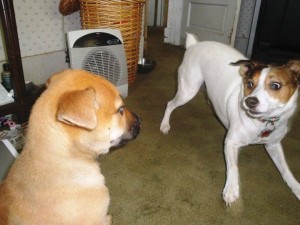Now You See Me: Trusting Your Gut on Interactions
Instincts. Some people trust them, some think that without cold hard facts, trusting a ‘feeling’ is a bad idea. I am on the side of ‘trust your gut’, so to speak. Instincts are nothing more than your mind acting as a computer, processing things that you have seen or experienced before, to make split second decisions. Think of them as notifications. I have written about instincts in other contexts before. This context is about interactions.
If you haven’t read the book Blink, by Malcolm Gladwell, I strongly encourage you to do so. Blink very succinctly explains instincts far better than I can, in great detail. So I will leave much of the detail to Mr. Gladwell and give you the high points.
Successful multiple dog household interactions sometimes require split second decisions on the part of the humans overseeing the crew. You must often trust what you see instantly, whether your brain has time to process it into complex thoughts or not. Multiple dog interactions can go badly in a nanosecond. I sometimes get clients saying that they felt uncomfortable about a certain situation but had no facts to go on. And then something bad happened because they ignored that feeling. It doesn’t matter if you have what you think are facts. Listen to your gut.
You will learn what is and isn’t good, much of the time, by what some people call a gut feeling. That gut feeling is nothing more than a slice in time. That slice gives you information. That information travels through your brain and accesses information that has previously been processed from other scenarios. So that slice is processed by your unconscious mind far faster than your conscious mind. Your unconscious mind is giving you a nudge about what may have happened when this slice in time was similar to another slice in time. Trust that nudge.
I can almost hear some people talking about double blind studies and what not. I love science. Really, I do. Science gives us so much validation in so many areas that we already knew were accurate. But I equally love experiences and knowledge that cannot in any way be validated by science. While now it’s possible for quality dog behavior professionals to point out individual actions of body language and explain why such and such is good or bad or somewhere in between, it’s often not something that the average dog parent has an extensive education on. But they do have eyes. Multiple dog parents and households with only (perish the thought!) one dog in their charge owe it to themselves to learn as much as they can about canine body language and the many subtle contexts that can influence it. In the multiple dog household, having such knowledge will prevent issues. In any household that loves and parents a dog, having such knowledge will enhance your relationship and communications and understanding with your dog to such an extent that you cannot even put a price on it. It’s that important. You will see such relief on the faces of your crew that you ‘get’them. It’s a priceless look.
So back to slices in time. If you know what you are looking at, based on such previous slices in time, you can act in time to make sure that all interactions in your household run as smoothly as possible. This is what we all want, right? Happy crews? Learn to really see your crew in action. Read about body language in dogs. Watch videos about body language. Hire a qualified professional to interpret things for you so that you can learn to do it yourself. Feel free to share your story about any of the above if you feel so inclined.
Posted in: Projects
Leave a Comment (0) →




